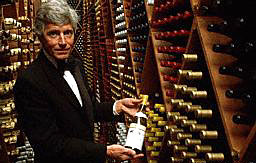

Wine has a rare quality among all our foods and drinks:It can improve for years. Good wine can get better, but not all wine improves with age, and wines age at different rates.
When it was found that a good vintage could get better if kept, wine made the leap from an ephemeral beverage to something close to the sublime. For most of the time that wine has been made, the newest wine has been considered the best. This meant that medieval wine merchants would hasten to sell the "old" stock when a vintage was approaching, for they knew that customers would prefer the fresh new wine. The customers also took it for granted that wine would get worse if kept. Merchants had no idea why wine became vinegar, and did not suspect that poor winemaking, dirty storage casks and exposure of wine to the air would hasten its decline. The Romans, and many cultures since, have found that good wine tightly stoppered — be it in a pottery amphora, a well-made cask or a glass bottle — can get better, not worse, with age. Roman vintages were prized at a century old. But it was not until the 18th century that wine began to be made deliberately, on a large scale, to be aged. Winemakers, in Bordeaux and elsewhere, began to exploit the quality of wine that allows it to gain in taste and subtlety if it is aged. There are two kinds of ageing: in a wooden cask or other container, and in the bottle. The first is entirely the job of the winemaker, and the second may also be partly under the wine-maker's control. But bottle-ageing is more the job of the merchant or, increasingly, the final purchaser of the wine. Some wines need no ageing, and are ready to drink when sold. Others gain from a few months in bottle; but they, and the first group, rapidly lose freshness if kept in bottle too long. It is just as important to know which wines to drink soon as it is to know which need to be kept. It is useful to know how a given wine has been matured if you want to establish the optimum;
time to drink it. For instance, some Spanish and Italian wines are matured for long periods in cask and bottled when virtually ready to drink. Bottle-age adds little if anything to these wines for they are already mature when bottled. Wines such as vintage port are bottled after little cask-ageing and need long years in bottle to mature. Others, such as red bordeaux, spend up to two years in new oak casks, then must spend more years in bottle.
|
|
|



